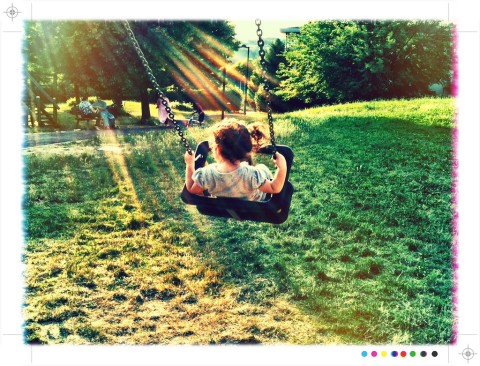We like the forgotten playgrounds best. The ones that feel like stepping back in time with their rusty ladder rungs. But today we are running out of time—her mother wants her home for dinner—so we drive through the curvy streets of identical houses in Crystal Creek. The playground there is made of wood and shaped like a ship. It has a little lookout on the top and she likes to climb up there and say, “Grandma, let’s sail to Greece!” I have no idea where she comes up with these things.
This is how we pass the days while her mother works, while her father is gone. We eat burgers and fries and shakes and sandwiches made with processed meat, topped with orange cheese and pickles. We eat chicken nuggets dunked in honey mustard sauce and ice cream cones dipped in chocolate that hardens to a shell—all the things her mother won’t allow her to eat. I let the ice cream and the chocolate run down her face and her hands. I don’t scold her to be neater, to lick the cone in a methodical way in order to avoid the mess.
I should tell her that tomorrow she will go to someone else’s house. I should tell her that this is our last day together because her mother doesn’t want my help anymore. But I can’t bring myself to say any of those words.
For months, we’ve gone from playground to playground. There are so many little ones secreted away if you know where to look for them. The jungle gym behind St. Paul’s Methodist Church is a good one but too many people go there. She and I, we like to have a place to ourselves. She stares out the window from the backseat and shouts, “There, Grandma!” when she catches a glimpse of something that might be a slide, a plastic rock formation, a merry-go-round. I think about driving off with her. Together we’ll traverse the country looking for her father underneath teeter-totters and monkey bars.
I slow down as we approach the Crystal Creek playground. There is often a young mother with a newborn and a toddler here and I don’t want to see them today. She always thrusts her newborn into my arms. People assume a grandmother wants to hold the baby but I almost never do. When she is there, I take the little pink bundle in my arms and coo as expected. I want to tell the mother that her girls, with their matching pink headbands and white tights, will be her undoing some day. She should aim for sturdier girls, ones who aren’t afraid of getting dirty, ones who can withstand the losses life has in store.
The woman isn’t there so I park the car and my granddaughter frees herself from the car seat, sticky with melted ice cream, and runs straight for her position as captain of the ship. The ground is wet from last night’s rain but she isn’t afraid of wet grass and dirt. She takes the ship’s wheel in her hands while I sit on a swing and rest my feet. It’s hard work keeping up with a four-year old.
When he was a child, her father loved to hang upside down from monkey bars, just like her. One day he climbed a jungle gym higher than the kids twice his age. One mother panicked and told him to get down, she said he would fall and die. He looked down at me from the top rung as if to ask if it was true. But I didn’t panic, I told him where to place his hands and his feet, guiding him down. There are so many things I want to tell her—about her father, about men in general, the way they sometimes run off but it doesn’t mean they don’t love you.
“Grandma, come!” she says. We’re about to set sail, the crew is bringing up the anchors. She tells me to hurry up and climb aboard. I stop the swing; a leaf is stuck to the bottom of my sandal, a bit of mud clings to my toe. I climb the wooden ladder onto the ship. My granddaughter is busy ordering her imaginary crew around but she nods to me in acknowledgement. We’re ready now.
She makes a horn sound and we’re off. The swings and the muddy ground recede. The waves lap below us, and slowly the shore disappears from view. We float silently in our wooden ship to Greece. Maybe we’re sailing toward her father. Maybe we’re sailing away from him. Maybe it doesn’t matter as long as the two of us are together here on the sea. The sun sinks and it’s so beautiful I want to call my granddaughter over to show her: the shades of orange and red reflecting off the clear blue water below us. But she’s busy steering the ship, watching out for rocks and waves. She will not be home in time for dinner.



 In its third year, The March Micro Marathon will be, as usual, a prompt-a-day whirlwind for 24 days. You’ll exchange drafts of micro fiction, non-fiction, and prose poetry in small groups and gather for a series of online events (all recorded for participants unable to attend live). We’ll finish with 3 competitions, and participants who are not already in SmokeLong Fitness will be invited to workshop with SmokeLong Fitness until the end of April!
In its third year, The March Micro Marathon will be, as usual, a prompt-a-day whirlwind for 24 days. You’ll exchange drafts of micro fiction, non-fiction, and prose poetry in small groups and gather for a series of online events (all recorded for participants unable to attend live). We’ll finish with 3 competitions, and participants who are not already in SmokeLong Fitness will be invited to workshop with SmokeLong Fitness until the end of April!